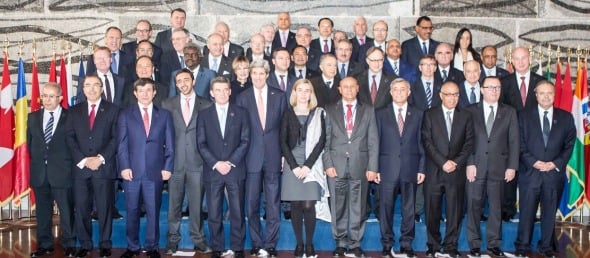By Libya Herald staff.

Tripoli, 6 March 2014:
The international community has reaffirmed it commitment to help Libya through . . .[restrict]its difficult transition stage at the Friends of Libya conference in Rome yesterday. This will be done through continued technical assistance, training and capacity building.
Following on the last year’s conference in Paris which had been a gathering of those countries that had backed the Libyan revolution, there were a number of significant additions this year, notably China and Russia, plus all Libya’s neighbours.
“The reason that my counterparts and I came to Rome today,” said US Secretary of State John Kerry after the meeting, “was to demonstrate our commitment all together – the huge number of countries that came together to demonstrate our commitment to Libya’s democratic transition”.
As well as the five permanent UN Security Council members, participants included Algeria, Bulgaria, Canada, Chad, Denmark, Egypt, Finland, Germany, Greece, Italy, Japan, Jordan, Mali, Malta, Mauritania, Morocco, Niger, Norway, Qatar, Portugal, Slovenia, South Korea, Spain, Sudan, Switzerland, Sweden, The Netherlands, Tunisia, Turkey, the UAE, the African Union, the Arab Maghreb Union, the EU, the Gulf Cooperation Council, the Arab League, NATO and the UN, the latter in the person of Tarek Mitri, the Special Representative of the UN in Libya.
The world, Kerry said, recognised that that Libya was at “a pivotal moment ” as it drafted a post-revolution constitution and moved towards national reconciliation and elections. But, he added confidently, “Libyans did not risk their lives in the 2011 revolution just to slip backward into thuggery and violence”. There were major challenges, but the US and it partners would continue “to work closely to fight terrorism, to prevent the spread of conventional weapons and to secure those weapons where they should be secured, and to build democratic institutions”.
The 40-strong Libyan delegation, led by the Prime Minister, Ali Zeidan, and the President of Congress, Nuri Abu Sahmain, was invited, representing as broad a spectrum of Libya society as possible, the aim being to commit all Libya’s groupings to reconstruction and to dialogue with each other and Libya’s partners.
It included ten Congress members and leaders from different political movements including the Justice and Construction Party leader Mohamed Sawan, Libyan Homeland Union leader Abdurrahman Sewehli, prominent Muslim Brotherhood supporter Nizar Kawan as well as the Ministers of Defence, Justice, Electricity, Telecommunications, the Deputy Minister of Interior, the head of the Warriors Affairs Commission, together with revolutionaries and representatives of civil society.
Fears that Zeidan and Abu Sahmain would give opposing speeches and so undermine international resolve to support Libya did not materialise.
Stressing Libya’s commitment to peaceful democratic transition, Zeidan told participants that the it was working on holding early elections to replace Congress, was implementing a decentralised system of government and implementing strategies to control flow of weapons and the control of Libya’s porous borders. His government was also committed to national reconciliation and reactivating the economy.
A similar message came from Abu Sahmain. Libya would, he said, support the democratic process, rejecting any attempt to take power by force. The peaceful transition of power was irreversible, he insisted.
Blaming the current crisis on the accumulation of the failures of Qaddafi’s 42 years in power, high expectations and democratic inexperience, he accused former regime figures of trying to stir up unrest. The country needed international help in training, capacity building and technology transfer, he said, most especially in building up security, the police and army, and in border protection and the fight against illegal immigration, terrorism and drugs smuggling.
He called on the world to ensure that it bought Libyan oil through official channels only. He also promised that means would be found so that the voice of those who did not take part in last month’s elections to the Constitutional Assembly, especially those from the country’s ethnic minorities, could be heard.
Observers at the conference, however, noted that even if Zeidan and Abu Sahmain had clashed, the world could not turn its back on Libya, whatever it might wish, because of concerns about its potential use as a base for international terrorism and the country’s location as the prime route for human trafficking from Africa into Europe.
Thus, despite many comments from participants about the unstable situation in Libya, such as that from French Foreign Minister Laurent Fabius who called it and “very worrying”, there were also repeated commitments to help as well as calls for national dialogue and reconciliation to overcome differences. These were said to be the key to stabilising Libya.
In a statement issued at the end of the conference, Libya’s allies and partners made clear their support for an interim replacement of Congress to be elected ahead of the new constitution being drafted, calling on Libyans “to forge broad consensus on management of the transitional period” and to ensure “an orderly handover of power to a new elected body and contribute to stabilising the current situation in Libya and in doing so . . . refrain from using violence in the political process”.
They also expressed concern about the continuing violence in Cyrenaica particularly the systematic assassinations in Benghazi. They called for “quick and concrete steps by the authorities to improve security and bring the perpetrators to justice” and said that they were determined “to support the authorities to achieve such a goal”.
They likewise stressed the importance of women participating fully in the decision-making process and the establishment of national institutions at all levels, that constitutional-drafting process had to involve “all political forces and components of Libyan society”, and the urgent need to resolve the continuing disruptions of energy and oil exports. Securing Libya’s border’s was “the urgent priority” for the country, they said,. They also called for the immediate implementation of the enacted law on torture, enforced disappearances and discrimination.
It was agreed that the next Friends of Libya conference will take place in Turkey.
[/restrict]







